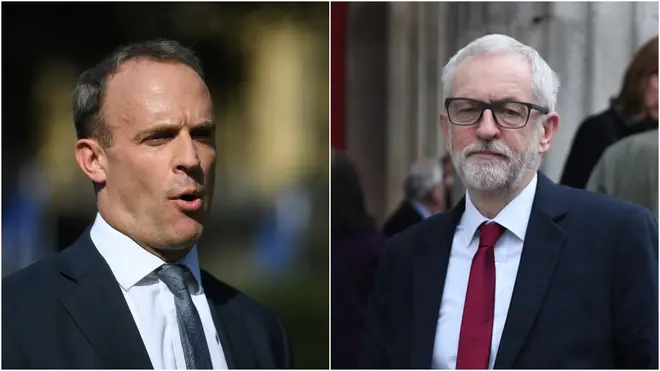
Oli Dugmore 4am - 7am
3 January 2020, 12:23

Foreign Secretary Dominic Raab has called for a de-escalation in tensions between the US and Iran after an American drone attack killed an Iranian general in Iraq.
Iran has threatened "crushing revenge" against the US after President Trump ordered an attack in which Iranian General Qassem Soleimani was among seven people who died.
Outgoing Labour leader Jeremy Corbyn described the "serious and dangerous escalation" as an "assassination" and called for the UK to stand up to the "belligerent actions" from the US.
The UK Government advised all British nationals to seek their advice before travelling to the nation, while the US Embassy in Baghdad warned all American citizens to "depart Iraq immediately."
Follow the latest developments in our live blog.
The US Defence Department said Gen Soleimani was targeted because he was "actively developing plans to attack American diplomats and service members" in the region.
Political figures and world leaders reacted to the news of General Soleimani's death, with Iran promising retribution against the US following the death.
Russia's Foreign Ministry is quoted as saying the killing was "an adventurist step that will increase tensions throughout the region."
Discussed with @DominicRaab the recent decision to take defensive action to eliminate Qassem Soleimani. Thankful that our allies recognize the continuing aggressive threats posed by the Iranian Quds Force. The U.S. remains committed to de-escalation.
— Secretary Pompeo (@SecPompeo) January 3, 2020
Iran's Supreme Leader Ayatollah Ali Khamenei warned that "severe revenge awaits the criminals" behind the strike and announced three days of national mourning.
Mr Raab issued a statement saying the Government had "always recognised the aggressive threat posed by the Iranian Quds force led" by the general.
"Following his death, we urge all parties to de-escalate. Further conflict is in none of our interests," Mr Raab added.
He was expected to speak to US Secretary of State Mike Pompeo on Friday morning.
In a statement, Mr Corbyn said "the US assassination" of the general "is an extremely serious and dangerous escalation of conflict in the Middle East with global significance".
"The UK Government should urge restraint on the part of both Iran and the US, and stand up to the belligerent actions and rhetoric coming from the United States," the MP added.
"All countries in the region and beyond should seek to ratchet down the tensions to avoid deepening conflict, which can only bring further misery to the region, 17 years on from the disastrous invasion of Iraq."
Labour leadership hopeful Clive Lewis, who served as a Territorial Army officer and completed a tour of duty in Afghanistan, warned that the "violent escalation in an already volatile region is a mistake" which should not be "compounded" by UK support.
"I call on the PM to condemn this cowboy action & turn immediately to our international institutions to try & de-escalate any war with Iran," the former shadow defence secretary tweeted.
The US assassination of Qasem Soleimani is an extremely serious and dangerous escalation of conflict with global significance. The UK government should urge restraint on the part of both Iran and the US, and stand up to the belligerent actions and rhetoric coming from the US.
— Jeremy Corbyn (@jeremycorbyn) January 3, 2020
Prime Minister Boris Johnson, who has been celebrating New Year on the private Caribbean island of Mustique, is yet to comment.
Labour MP Lisa Nandy, who is also considering a run to replace Jeremy Corbyn, said it is "a very dangerous moment".
She added: "17 years after the catastrophic decision to go to war in Iraq violence still rages every day. World leaders must stand up to (US President Donald) Trump. The last thing we need is another all-out war."
Stella Creasy, a Labour MP, called for an "urgent statement" from the PM or Foreign Secretary and suggested a recall of Parliament was needed before Tuesday.
Green MP Caroline Lucas said the strike was "a hugely provocative act in a massively volatile region".
"UK Government must condemn it and work with colleagues in the US to counter Trump's reckless and dangerous foreign policy," she added.
Tory MP Tobias Ellwood, a former defence minister who served as a captain in the Army, tweeted "this is big", adding: "Expect repercussions."
Former Middle East minister Alistair Burt told the BBC that the airstrike was "extremely serious" and could cause "a huge potential escalation".
Mr Burt, who stood down as a Tory MP at the last election, stressed it is "very important now to concentrate on what happens next, and for everybody involved diplomatically to do everything they can to try and diffuse the situation".
#Iraq: Due to heightened tensions in Iraq and the region, we urge U.S. citizens to depart Iraq immediately. Due to Iranian-backed militia attacks at the U.S. Embassy compound, all consular operations are suspended. U.S. citizens should not approach the Embassy. pic.twitter.com/rdRce3Qr4a
— Travel - State Dept (@TravelGov) January 3, 2020
The Foreign Office advises British-Iranian dual nationals against all travel to Iran and for other British nationals to seek the department's advice before travelling to the nation.
British nationals risk being arbitrarily detained or arrested by Tehran, the department warns.
They also warned demonstrations and marches in cities across Iran "could become angry."
Nazanin Zaghari-Ratcliffe has been among the dual nationals being held in Iran since she was arrested in 2016 and accused of spying while visiting family.
Her husband warned "things are getting much worse" for relations with Iran, and told ITV's Good Morning Britain: "I sit here partly worried for what that means for Nazanin, partly worried what that means for my in-laws, sat in their ordinary living room in Tehran where they're all really worried."